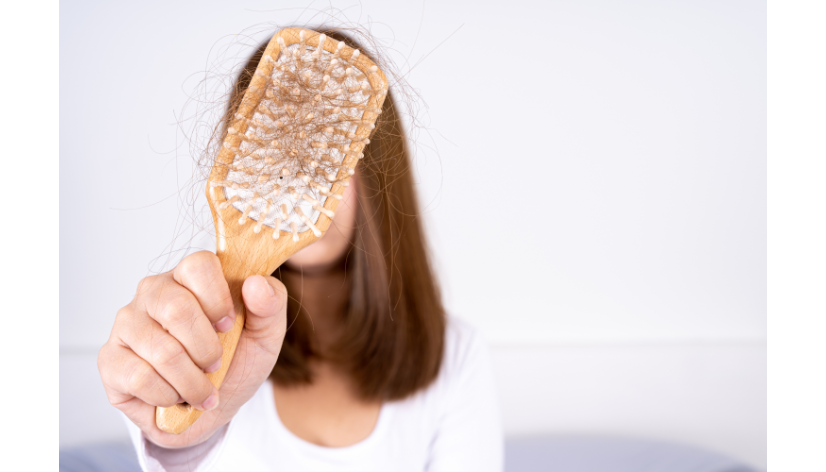Introduction
Embarking on a weight loss journey is a commendable decision that promises a myriad of health benefits. However, it’s crucial to understand that weight loss can sometimes come with unexpected side effects, and one of the less-discussed concerns is the relationship between shedding pounds and losing hair. In this blog post, we’ll delve into the intricate connection between weight loss and hair loss, exploring the potential causes, dispelling myths, and offering practical tips to maintain a healthy balance.
The Skinny on Weight Loss
Before we dive into the world of hair loss, let’s briefly explore the mechanics of weight loss. Shedding excess weight is often associated with improved overall health, increased energy levels, and enhanced self-esteem. Whether you’re adopting a new workout routine, making dietary changes, or a combination of both, weight loss is a journey that demands dedication and consistency.
The Hair-Raising Link
While weight loss can have numerous positive effects on your well-being, it’s not uncommon for individuals to notice changes in their hair during the process. The connection between weight loss and hair loss is multifaceted and can be influenced by various factors
1. Nutrient Deficiency:

One of the primary culprits behind hair loss during weight loss is nutrient deficiency. Crash diets, extreme calorie restrictions, or imbalanced eating habits can deprive your body of essential vitamins and minerals crucial for maintaining healthy hair. Nutrients such as iron, zinc, biotin, and vitamin D play pivotal roles in hair growth and maintenance.
2. Hormonal Fluctuations:
Weight loss can lead to hormonal fluctuations in the body, affecting the delicate balance necessary for healthy hair growth. Changes in estrogen levels, in particular, may contribute to hair shedding. Hormonal imbalances can be exacerbated by factors like stress, inadequate sleep, and intense physical activity.
3. Caloric Restriction and Stress:
Rapid weight loss through extreme caloric restriction or strenuous exercise can induce physical stress on the body. This stress, combined with the psychological stress of weight loss itself, may trigger a type of hair loss known as telogen effluvium. This condition pushes a significant percentage of hair follicles into a resting phase, resulting in increased hair shedding.
Debunking Myths
Before delving into practical tips for maintaining a balance between weight loss and hair health, let’s dispel a common myth: the belief that all weight loss leads to hair loss. It’s essential to recognize that gradual and well-balanced weight loss plans are less likely to cause significant hair shedding. Crash diets and extreme measures are more likely to disrupt the delicate equilibrium necessary for healthy hair growth.
Maintaining a Healthy Balance
1. Prioritize Nutrient-Rich Foods:
Opt for a well-rounded, nutrient-dense diet that includes a variety of fruits, vegetables, lean proteins, and whole grains. Ensure you’re getting adequate amounts of vitamins and minerals essential for hair health, such as iron, zinc, biotin, and omega-3 fatty acids.
2. Gradual Weight Loss:
Instead of opting for drastic measures, aim for a gradual and sustainable weight loss approach. Losing 1-2 pounds per week is generally considered a healthy and maintainable pace. This allows your body to adapt gradually, minimizing the risk of nutrient deficiencies and hormonal imbalances.
3. Hydration Matters:

Don’t overlook the importance of staying hydrated. Water plays a crucial role in maintaining overall health, including the health of your hair. Dehydration can contribute to brittle and dry hair, so make sure you’re getting an adequate amount of fluids each day.
4. Incorporate Strength Training:
Including strength training exercises in your workout routine can help preserve muscle mass during weight loss. This, in turn, contributes to a healthier metabolism and reduces the risk of extreme hormonal fluctuations.
5. Consult a Professional: If you notice significant hair loss during your weight loss journey, it’s advisable to consult with a healthcare professional or a registered dietitian. They can help identify any underlying issues, provide personalized advice, and recommend supplements if necessary
Conclusion
Leaving on a weight reduction venture is an honorable step towards a better way of life Understanding the potential link between weight loss and hair loss allows you to make informed decisions and take proactive steps to mitigate any adverse effects. By prioritizing a gradual and balanced approach, nourishing your body with essential nutrients, and seeking professional guidance when needed, you can achieve your weight loss goals while maintaining luscious, healthy locks. Strive for a holistic approach that prioritizes both your physical and mental well-being, ensuring a journey that not only transforms your body but enhances your overall quality of life.
FAQs
Q1: Can weight loss cause hair loss?
A1: Yes, weight loss can be associated with hair loss, especially when it is rapid or involves extreme measures. Nutrient deficiencies, hormonal fluctuations, and physical stress on the body can contribute to shedding.
Q2: Are all weight loss methods equally likely to cause hair loss?
A2: No, gradual and well-balanced weight loss plans are less likely to cause significant hair shedding. Crash diets and extreme measures are more likely to disrupt the delicate equilibrium necessary for healthy hair growth.
Q3: Which nutrients are crucial for preventing hair loss during weight loss?
A3: Essential nutrients for hair health include iron, zinc, biotin, vitamin D, and omega-3 fatty acids. A well-rounded, nutrient-dense diet that includes a variety of foods can help ensure you get these vital nutrients.
Q4: How much weight loss is considered healthy to avoid hair loss?
A4: Losing 1-2 pounds per week is generally considered a healthy and sustainable pace. Gradual weight loss allows the body to adapt gradually, minimizing the risk of nutrient deficiencies and hormonal imbalances.
Q5: Can dehydration contribute to hair loss during weight loss?
A5: Yes, dehydration can contribute to brittle and dry hair. Staying adequately hydrated is crucial for overall health, including the health of your hair.
Q6: Is it normal to experience some hair shedding during weight loss?
A6: A modest amount of hair shedding is normal, as hair goes through natural growth cycles. However, if you notice excessive shedding or thinning, it’s advisable to consult with a healthcare professional.
Q7: How can I prevent hair loss during weight loss?
A7: Prioritize a gradual and balanced approach to weight loss, ensure a nutrient-dense diet, stay hydrated, incorporate strength training, and seek professional advice if you notice significant hair loss.
Q8: Are there specific hairstyles or treatments that can help minimize the appearance of thinning hair during weight loss?
A8: Choosing hairstyles that add volume, avoiding excessive heat styling, and using gentle hair care products can help minimize the appearance of thinning hair. However, addressing the root cause by maintaining a healthy lifestyle is essential for long-term results.
Q9: Should I take supplements to prevent hair loss during weight loss?
A9: It’s advisable to get essential nutrients from a well-balanced diet. However, if you have identified specific deficiencies or have concerns, consult with a healthcare professional before considering supplements.
Q10: When should I seek professional help for hair loss during weight loss?
A10: If you notice significant hair loss, changes in hair texture, or persistent shedding, it’s recommended to consult with a healthcare professional or a registered dietitian. They can assist with distinguishing fundamental issues and give customized direction.

